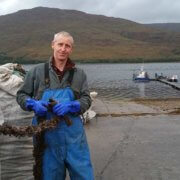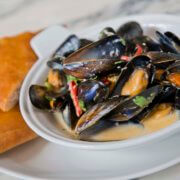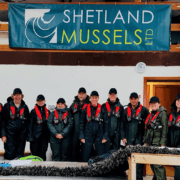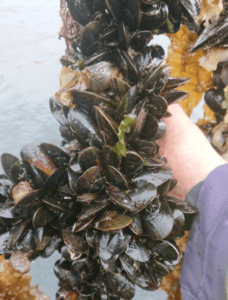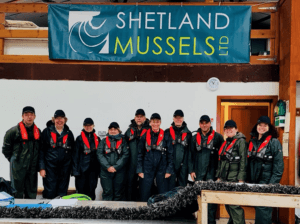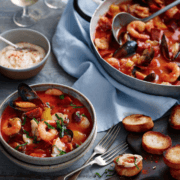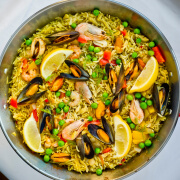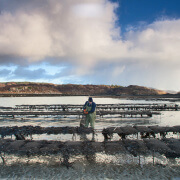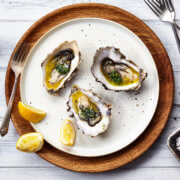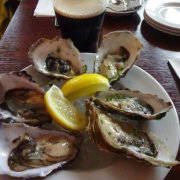Tag Archive for: Scottish Shellfish
Hi, I'm Alan Bryne. I'm a mussel farmer and I farm with my brother Lawrie on the West Coast of Scotland. We are producers of high-quality rope grown mussels, our farm is based near Fort William, Inverness-shire.
Optimum growing conditions
Our mussels are grown in the pure, plankton rich waters of the North Atlantic, free from contamination, which offers optimum growing conditions.
Our mussel farm was established in 1999, and we both enjoy looking after the farm and working on new innovations. The best thing about my job is when we harvest a good crop of great quality mussels for our customers to enjoy.
Hard part of the job
The hardest part of my job is having to deal with the ever-changing challenges that the wonderful mother nature throws at us! However, we are planning on doubling our production over the next few years, whilst keeping the excellent quality mussel we currently produce.
The future
Our future innovations are looking into optimising mussel growth and quality by using different farming locations for different growth stages of our mussels. Traditionally we would grow them from spat to harvest at the same location.
Our mussel farm operates a strict monitoring program, taking regular samples for testing in an accredited laboratory, ensuring our mussels are always safe to eat.
Fascinating facts about Scotland’s favourite shellfish . . .
Sales of mussels are on the increase, at home and abroad. You can see from our site how popular mussel recipes are and Scottish shellfish is celebrated the world over. Last year (2017) saw the first ever National Mussel Day. Using the hashtag #musselup, the campaign focused on raising the profile of mussels across social media. National Mussel Day was so successful that it’s here to stay. Sunday Oct 7 is National Mussel Day 2018. To celebrate, here are some fascinating facts about one of our most popular shellfish.
Did you know?
A much-loved mollusc
- In Scotland (and across the North Atlantic) the most common mussel is the Blue Mussel (Mytilus Edulis).
- Mussels can live for up to 50 years. We don’t tend to eat them at the end of their lives though! The average age of our mussels ready for consumption is 2.5 to 3 years.
- Male and female mussels are different colours – the male is a creamy white and the female is an orangey colour.
- When it comes to diet, mussels only eat plankton. To extract the plankton, in one day they can filter 65 litres of water.
- Mussels produce liquids which set in seawater to form tough fibres called byssal threads or beards. These threads are five times stronger than a human tendon and can cling to a Teflon surface.
- Mussels can defend themselves from predators such as the dog whelk, and other snails by tying them down with its byssal threads.
- Mussels close their shells when the tide drops so that they don’t dry up when they’re out of the water.
- Other than snails, mussels’ main predators are starfish and seabirds.
- Like the oyster, mussels can also produce pearls. But these are limited to freshwater mussels and are much rarer.
- Although it may look less than pristine, if the mussel shell is covered with barnacles this is usually a good sign that the mussel is wild, fresh and healthy.
History
- Mussels have been used as a food source for more than 20,000 years. And many prehistoric settlements in Scotland have been identified by large mounds of mussel shells close by.
- The first mussel farm dates back to the 8thcentury and was located in France.
Health
- Mussels have the most impressive nutritional profile of all the shellfish. Consumption of mussels can help reduce inflammatory conditions such as arthritis. And the minerals they contain help build immunity.
- Mussels are considered a brain food due to the high levels of vitamin B12 that they contain.
- Mussels are chock full of protein, iron and folic acid. In fact, ounce for ounce, they contain more protein than beef stock.
- They’re healthy in so many ways. 100g of mussels only contains 58 calories!
Cooking
- Mussels have so much water within their shells that you don’t need to add water when you steam them.
- Mussels need to be alive when you cook them. Don’t cook them if the shells are already open and don’t eat them if the shells remain closed after cooking.
- Moules and frites (mussels and chips) is actually the national dish of Belgium, although more often associated with France.
Working up an appetite?
Yes, there’s more to the humble mussel than meets the eye. And is all this talk making you hungry? Don’t forget to check out our recipes and #musselup this October.
Happy National Mussel Day everyone!
Summer is over
I am writing on a brisk Shetland autumn day, which anyone might mistake for a full-blown winter’s gale in more southerly climates. As often as not up here, the weather snaps from summer to winter in one fell swoop and the summer seems very much behind us now. Despite southern parts of Britain getting a final flourish of heat, we seem to be lined up for several weeks of gales and cool temperatures of 7 degrees or below. So, I’m calling it - summer is over.
Unique shellfish
It is however the cold temperatures and cold sea water that make our shellfish unique. So, getting into this part of the season has its benefits and it is one of the best times of the year for the mussels themselves. They have just had a long summer of warm days, plenty of plankton to eat to build up their meats and followed by the current cooler conditions for harvesting mean they should be getting to market in top condition right now.
Visitors
Despite the cooler conditions, we have had a few visitors to the sites lately with the first being the board of Food Standards Scotland making the trip north to find out more about how we farm. We discussed their sampling programme and how that works to classify our areas and ensure plankton blooms over the summer cannot cause the shellfish to become unsafe to eat. We also talked about the extra work and testing we do on every harvest, to make sure all the shellfish we harvest are safely farmed and sustainable. It was a really useful day and was great they made the effort to come up and see us.
Fresh mussels for the Chefs
The following week we had a delegation from Seafood Scotland, who had invited a group of Chefs up from the UK Mainland to also get the chance to see what we do. We were able to show them the farms and also the factory where Scottish Shellfish boxes up the mussels for the wholesale markets. They were keen to get their hands on some shells and take them up to the local award-winning restaurant Frankie’s and try their own recipes with product still dripping with seawater. They too seemed to enjoy the visit and hopefully went back fully inspired to use our shellfish in their daily menus.
Autumn harvesting
Moving through autumn we expect to mainly be harvesting, getting the sites battened down for the rest of the winter and planning for next year’s spring spat input. You can follow Shetland Mussels on twitter for more regular updates of farm happenings @ShetlandMussels
Sustainability
Sustainability. It’s a word that is bandied around a lot these days. And at Scottish Shellfish it’s at the very heart of what we do. But do you know what it actually means?
A fragile balance
Today, we’re very aware of environmental issues. We’re bombarded with shocking pictures of wildlife (birds, seals and fish in particular) festooned or swathed in plastic waste that we’ve simply discarded, which threatens their wellbeing and potentially their very existence. But does our awareness translate into action?
Sustainability defined
When it comes to the environment, it’s clear our global practices need to change. You can read the science bit here but the basic definition of sustainability – one which we can all understand – is the creation, build and use of items and organisations which won’t damage our environment or our society, in a bid to protect our future and our children’s future.
But more than simply understanding the definition of sustainability, it’s important that we take the time to consider the consequences of our current global behaviour if it continues unchecked. The scale of the problem we face can be daunting, but we can all do our bit to arrest, if not reverse the damage done.
Scotland at the forefront
When it comes to seafood and Scottish seafood in particular, sustainability is key. Thanks to our cold, clear waters, as a nation our seafood and our shellfish are amongst the most celebrated. Here’s some stats which might surprise you…
- Scotland is one of the largest seafood producers in Europe
- Scottish seafood (via the Scottish Development International) was the official partner of the World Gourmet Summit in Singapore in 2016
- We’ve got one of the most modern fishing fleets in Europe
- Over two thirds of the world’s langoustines are sourced from Scottish waters.
And we’re no slackers either when it comes to the Marine Stewardship Council (MSC) accreditations.
What is the MSC?
Scotland holds more Marine Stewardship Council (MSC) accreditations than most EU countries. Established in London in 1997, the Marine Stewardship Council (MSC) exists to ensure that global fisheries commit to sustain stocks in the wild instead of aquaculture farmed fish. MSC-certified fish is now available in a total of 97 countries, and 10% of all wild seafood is now being caught to the MSC standard.
Sustainability at Scottish Shellfish
It’s easy to understand why, as UK's premier producer of finest quality shellfish, Scottish Shellfish take sustainability so seriously. Our rope grown mussels are a great example of sustainability in practice. We suspend ropes from floats in the sea. Once the ropes are in place, our intervention stops. The young mussels settle naturally on our ropes and then grow simply by feeding on sea plankton. They don’t require any other feed source. Because they grow by suspension, there’s no dredging which means they’re grit free when harvested.
When it comes to oysters, cultivation is similar, although instead of using ropes, we grow them in special mesh bags held on trestles in the inter-tidal zone. With an extremely low carbon footprint, our mussels and our oysters are arguably one of the most environmentally friendly food products around.
Do your bit
You don’t just have to take our word for it. Our oyster and mussel farms are independently certified by the Friend of the Sea. When you buy your seafood from us you’re doing your bit for the environment.
Now you’re here, take some time to browse our site, read our blog, and check out our recipes, safe in the knowledge that you’re making responsible choices which will help all of us secure the future of our seas.
Eat well, save money!
If you’re anything like us, you probably love food and hate waste. There are some quite shocking statistics out there about how much food is wasted every year. Last year, waste and recycling advisory body Wrap published a report which indicated that (when it comes to food) each UK family wastes over £470 every year. That translates to 7.3m tonnes of food, most of which could have been salvaged! This is especially shocking when you consider it comes at a time when both the use of food banks, and the number of families living below the poverty line, are rising.
Luckily, our collective consciousness is now well and truly tuned into this sad state of affairs. The government, supermarkets and independent food vendors now offer us lots of tips and tricks to make sure that we get the most out of the food that we purchase.
Good health, good planning
When it comes to shellfish, this is easy. If you start with the proviso that for good health, vitamins and long chain-omega-3 fatty acids, you should be eating two portions of fish a week, that’s a great basis for menu planning. And additionally, shellfish is low in fat and an excellent source of selenium, zinc, iodine and copper.
So far, so healthy. And there’s more good news. Today, seafood is very accessible. Because of its provenance, shellfish is often frozen. And frozen shellfish is available from all supermarkets, large and small. Fresh or frozen, it’s quite easy to gauge portion size for yourself and your family. And although we’re eating more and more seafood in general and shellfish in particular, these days seafood is still regarded as something of a treat, which generally means clean plates at the end of every meal.
Even if you do have leftovers, some menu planning means that your wastage will be nil. With a little care, your leftover shellfish will be as tasty and full of flavour for future use as possible.
- Rule number one with shellfish is to ensure that all leftovers are quickly refrigerated.
- Rule number two, don’t freeze them. Ice crystals will strip your cooked shellfish of its remaining flavour.
- Rule number three, take any leftover shellfish out of the shell before you pop it in the fridge; if you leave the shell on, the flavour can become too strong and spoil the delicate taste you expect.
So far, so delicious
So how do you use your shellfish leftovers? First off, eat them within two days of refrigerating. How you do that can be as simple or as complex as you want. Is there anything more delicious that a chilled cooked langoustine, straight from the fridge, dipped in hollandaise sauce? Or you can make soups, omelettes or salads with leftover mussels, prawns or crab. Mix your shellfish leftovers with mayonnaise for a delicious sandwich filling. Or try them with a cream sauce for an elegant starter. If you pop your leftover shellfish in at the absolute last minute, there’s no chance you’ll over cook them or spoil the texture. Less is more when it comes to shellfish.
Scottish shellfish recipes
We’ve got lots of great recipes you can try with your leftover shellfish. Have a look here for yourself. We’ve also handpicked a few for you too:
Your fishmonger or local market stall should be able to give you more ideas on how to cook your shellfish including your leftovers. And if you are especially creative and come up with your own recipes, please feel free to share them with us and spread the shellfish love!
Traditional healthy fare
Historically, shellfish was the food of the masses, but today it’s often regarded as a delicacy. And because of the relative rarity of consumption, some regard shellfish with suspicion. But seafood in general and shellfish in particular give us oils and vitamins which can help reduce heart disease, and they’re an important part of a healthy diet.
Genuine fast food
Our reluctance to eat shellfish is partly because we don’t know how to prepare it at home. Shellfish is a genuine fast food which requires little effort to prepare. And there’s evidence that this message is beginning to hit home.
An upward trend
Although production of shellfish varies every year (due to weather, market prices and poor growth) statistics show that the shellfish industry in Scotland (dominated by mussels, scallops and oysters) is growing. In 2016, for example mussel production increased by six per cent, pacific oysters are up by 31% from 2015, and queen scallop production has increased by a staggering 370% in the same period. The Scottish shellfish industry itself is valued at £11.7m. (Source: Scottish Shellfish Farm Production Survey 2016)
Sustainable Scottish fishing
Today, Scotland leads the way in sustainable fishing practices. Most seafood is farmed rather than hand-picked, although the mussels themselves are cultivated or rope-grown, and no additives or feed are used. Ropes are set up in a carefully selected clean water area and the mussels attach themselves to the ropes, to be harvested a few years later. Celebrity chef Jean Claude Novelli describes Scottish mussels farmed in Shetland as "the best in the world".
A family business
Traditionally, shellfish farming is a family business. Often established in remote coastal areas where employment opportunities were limited. Shellfish can’t be farmed intensively, cultivation requires specialist skills, sometimes honed over generations. Today there are nearly 200 shellfish farming businesses in Scotland, many of which are still family run.
Working together
Despite the focus on family-run businesses, our shellfish farmers often work together to market and sell their products at agreed prices. These co-operatives keep marketing prices down, and the market buoyant and healthy.
The personal touch
Although we work together with a number of different farmers, we still believe in the personal touch. All of our produce can be traced back to its original source. Our shellfish farmers are based on the west coast of Scotland and on Shetland, and their oysters, mussels and scallops have their own unique qualities depending on the skills and methods used and the farm itself. Our individual farmers’ stories contribute overall to the history of Scottish shellfish and are an important part of our own story. Click here to read our farmers' stories.
Next time you’re considering what to cook for a simple weekday supper, why not eschew the traditional pizza or spaghetti bolognaise and try mussels or scallops instead? We have lots of great recipes on our website which are quick and easy to prepare, and much healthier for you.
Scottish Shellfish and Guinness? With the exception of oysters, perhaps it’s not the most obvious choice. But sometimes the most surprising combinations can be the most delicious…
Celtic connections
As St Patrick’s Day looms, it’s not just Celtic connections that we Scots and Irish share. We both have a long history of making the most of our natural produce, and exporting our proud traditions.
Guinness
One proud Irish tradition is the brewing of Guinness. Unless you’ve been living under a rock, there’s no doubt you’ve heard of Guinness. Originally brewed in Dublin in 1759, it’s the national tipple. What you may not know is that (unlike other stouts or dark beers) Guinness is proven to have some health-giving qualities. The anti-oxidants it contains can help reduce blood clots and the risk of heart attacks.
A healthy and delicious combination
At a time when we’re bombarded with ever-more confusing dietary advice, it’s good to know that the health benefits of shellfish are also undisputed. Scottish shellfish and Guinness is a healthy and surprisingly delicious combination. So, why not push the boat out this St Patrick’s Day and try it for yourself? You don’t even need to go out to eat; there are lots of great shellfish recipes which you can wash down with a pint of the famous dark beer.
The ultimate fast food
Lots of people associate shellfish with high days and holidays. It’s certainly true that a brace of fresh oysters, a feast of tangy brown crabmeat or the taste of world-renowned lobster are an undeniable treat. But the seas and sea lochs of our west coast give us an embarrassment of riches when it comes to shellfish. Which means you don’t need to think of them only as a luxury, they’re more accessible than you think.
And as shellfish by their very nature require minimal cooking, they are the ultimate fast food. Why not consider making them an integral part of your diet? There are lots of simple, delicious recipes on our website. Whether you want to cook mussels, oysters, langoustines, crab or lobster – you’ll find something healthy, delicious and quick on our recipes page.
Unusual combinations
Don’t be afraid to try some more of our unusual and delicious combinations. Mussels for example lend themselves to a surprising variety of beverages such as white beer, prosecco, and even gin and tonic. We’re continually adding to the recipes on our site, so check back every week for the latest combinations which are surprisingly easy to make.
Remember to drink responsibly. Happy St Patrick’s Day. Cheers!
Scottish Shellfish

Latest from our farmers
 Welcome to Fassfern MusselsOctober 9, 2018 - 5:17 pm
Welcome to Fassfern MusselsOctober 9, 2018 - 5:17 pm Winter is coming . . .October 3, 2018 - 2:09 pm
Winter is coming . . .October 3, 2018 - 2:09 pm



